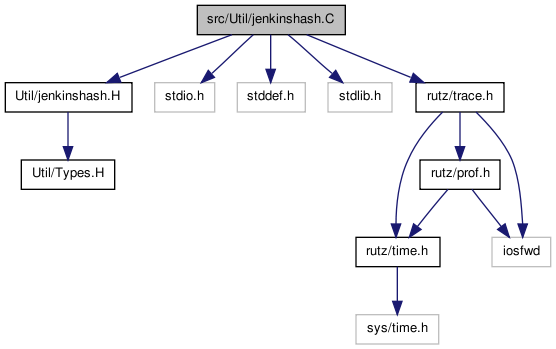

#include "Util/jenkinshash.H"#include <stdio.h>#include <stddef.h>#include <stdlib.h>#include "rutz/trace.h"
Go to the source code of this file.
Defines | |
| #define | hashsize(n) ((ub4)1<<(n)) |
| #define | hashmask(n) (hashsize(n)-1) |
| #define | mix(a, b, c) |
| #define | mix2(a, b, c) |
| #define | HASHSTATE 1 |
| #define | HASHLEN 1 |
| #define | MAXPAIR 80 |
| #define | MAXLEN 70 |
Functions | |
| uint32 | jenkinshash (const byte *key, uint32 length, uint32 initval) |
| hash a variable-length key into a 32-bit value | |
| uint32 | jenkinshash2 (const uint32 *key, uint32 length, uint32 initval) |
| Hash a variable-length key into a 32-bit value. | |
32-bit hash functions (NOT CRYPTOGRAPHIC!)
Definition in file jenkinshash.C.
| #define mix | ( | a, | |||
| b, | |||||
| c | ) |
{ \
a -= b; a -= c; a ^= (c>>13); \
b -= c; b -= a; b ^= (a<<8); \
c -= a; c -= b; c ^= (b>>13); \
a -= b; a -= c; a ^= (c>>12); \
b -= c; b -= a; b ^= (a<<16); \
c -= a; c -= b; c ^= (b>>5); \
a -= b; a -= c; a ^= (c>>3); \
b -= c; b -= a; b ^= (a<<10); \
c -= a; c -= b; c ^= (b>>15); \
}
Definition at line 68 of file jenkinshash.C.
| #define mix2 | ( | a, | |||
| b, | |||||
| c | ) |
{ \
a -= b; a -= c; a ^= (c>>13); \
b -= c; b -= a; b ^= (a<< 8); \
c -= a; c -= b; c ^= ((b&0xffffffff)>>13); \
a -= b; a -= c; a ^= ((c&0xffffffff)>>12); \
b -= c; b -= a; b = (b ^ (a<<16)) & 0xffffffff; \
c -= a; c -= b; c = (c ^ (b>> 5)) & 0xffffffff; \
a -= b; a -= c; a = (a ^ (c>> 3)) & 0xffffffff; \
b -= c; b -= a; b = (b ^ (a<<10)) & 0xffffffff; \
c -= a; c -= b; c = (c ^ (b>>15)) & 0xffffffff; \
}
Definition at line 82 of file jenkinshash.C.
hash a variable-length key into a 32-bit value
k : the key (the unaligned variable-length array of bytes) len : the length of the key, counting by bytes level : can be any 4-byte value Returns a 32-bit value. Every bit of the key affects every bit of the return value. Every 1-bit and 2-bit delta achieves avalanche. About 36+6len instructions.
The best hash table sizes are powers of 2. There is no need to do mod a prime (mod is sooo slow!). If you need less than 32 bits, use a bitmask. For example, if you need only 10 bits, do h = (h & hashmask(10)); In which case, the hash table should have hashsize(10) elements.
If you are hashing n strings (ub1 **)k, do it like this: for (i=0, h=0; i<n; ++i) h = hash( k[i], len[i], h);
By Bob Jenkins, 1996. bob_jenkins@burtleburtle.net. You may use this code any way you wish, private, educational, or commercial. It's free.
See http://burlteburtle.net/bob/hash/evahash.html Use for hash table lookup, or anything where one collision in 2^32 is acceptable. Do NOT use for cryptographic purposes.
Definition at line 441 of file jenkinshash.C.
Hash a variable-length key into a 32-bit value.
This works on all machines. jenkinshash2() is identical to jenkinshash() on little-endian machines, except that the length has to be measured in ub4s instead of bytes. It is much faster than hash(). It requires -- that the key be an array of ub4's, and -- that all your machines have the same endianness, and -- that the length be the number of ub4's in the key
Definition at line 447 of file jenkinshash.C.
 1.6.3
1.6.3